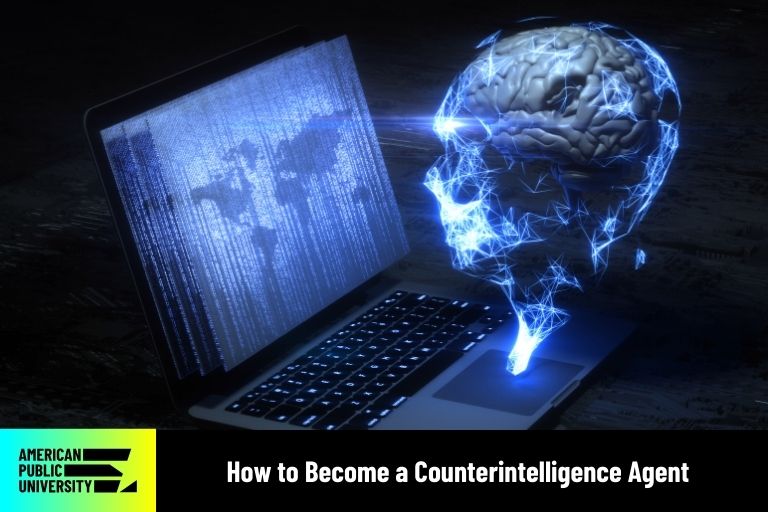09/15/2025

Understanding the Role of a Counterintelligence Agent
If you've ever wondered who protects a nation from foreign spies, counterintelligence agents are on the front lines—though you'll rarely hear about them. These professionals work behind the scenes to detect foreign intelligence threats, monitor subversive activities, and defend the integrity of sensitive operations. They serve in a variety of roles across the intelligence community, from military branches to civilian law enforcement, helping to identify and neutralize security threats before harm is done.
So, what does it take to become a counterintelligence officer? If you're interested in national security, seeking to transition into intelligence work, or simply exploring future careers in government defense, understanding the role of a CI agent—and how to pursue it—is an important first step. Explore the skills, education, and strategies that may help you prepare for potential roles in this highly specialized field.
What Does a Counterintelligence Agent Do?
A counterintelligence agent plays a serious role in national defense by investigating foreign entities, protecting classified information, and disrupting attempts to collect or exploit U.S. intelligence. These roles can exist within military structures or civilian agencies, including the FBI, CIA, and Department of Defense.
Common tasks usually include:
- Detecting and analyzing foreign threats
- Monitoring activities of potential foreign intelligence services
- Conducting interviews and surveillance on individuals suspected of espionage
- Investigating espionage, sabotage, or internal leaks
- Writing reports for government agencies or decision-makers
- Collaborating with intelligence officers, military officials, and security teams
The role of a counterintelligence agent is not a typical job. CI officers must assess risks, protect national interests, and often work under pressure with incomplete or ambiguous information.
Key Skills for Counterintelligence Agents
To become a counterintelligence agent, you need both a strong interest and mastery of critical thinking and problem-solving skills that align with real-world intelligence operations.
Essential skills include:
- Analytical ability: Detect patterns in vast amounts of intelligence data
- Ethical judgment: Make decisions under pressure with national stakes at risk
- Attention to detail: Small mistakes can lead to big consequences
- Interpersonal communication: Conduct interviews and build trust with human sources
- Legal awareness: Understand regulations regarding surveillance and security clearances
The job may involve dealing with sensitive information, countering hostile action, and interacting with other parts of the national security apparatus.
Educational Requirements for Counterintelligence Agents
Most counterintelligence officers hold a bachelor’s degree in a field related to defense, intelligence, or political science. Some roles may also require a master’s degree, especially in leadership or analysis positions.
Common degree areas include:
- Intelligence Studies
- International Relations
- Criminal Justice
- Political Science
- Security Studies
- Psychology or Sociology (for behavioral threat analysis)
An undergraduate certificate in counterintelligence may introduce individuals to key concepts such as ethics, legal frameworks, and operational strategies.
Graduate-Level Options
For those seeking to advance beyond the bachelor’s level, graduate-level study in counterintelligence or related fields can provide specialized knowledge and skills. Advanced coursework may include:
- Insider threat analysis
- Cyber intelligence
- Legal frameworks for intelligence operations
- International intelligence coordination
If you're wondering whether graduate-level programs in counterintelligence are worth pursuing, explore "Is a Master's in Counterintelligence Worth It?"
Specialized Training and Clearances
Counterintelligence officers—especially those in federal or military roles—must complete additional vetting and training.
Common requirements include:
- Top Secret or SCI Security Clearance
- Background investigations
- Polygraph testing
- Physical and psychological evaluations (depending on the agency)
- Specialized field training (e.g., Army CI School)
In the military, Army CI agents undergo intensive training and must meet specific ASVAB scores and MOS qualifications.
Military and Civilian Counterintelligence Career Paths
Individuals interested in counterintelligence may pursue various academic and professional paths, depending on whether they aim for civilian or military roles.
Civilian Counterintelligence Officers
- Often work for federal agencies (e.g., FBI, DHS, DOE)
- Focus on investigations, analysis, and counterespionage
- May conduct surveillance, interviews, and risk assessments
Military CI Agents
- Train in military-specific intelligence environments
- Work with combat units and force protection strategies
- Analyze foreign intelligence to prevent threats to military operations
Both roles may intersect with intelligence officers, cybersecurity teams, and law enforcement.
Typical Tasks of a Counterintelligence Agent
To clarify what a CI agent does, here are realistic examples of daily responsibilities:
- Investigate possible infiltration of sensitive government networks
- Analyze intercepted communications intelligence for signs of sabotage
- Assess threats from foreign governments or insider actors
- Brief superiors on vulnerabilities or potential operational risks
- Develop strategies to detect and neutralize foreign entities
- Participate in interagency efforts to manage large-scale threat responses
Who Is This Career Right For?
Counterintelligence is a field for individuals who are:
- Deeply interested in national security
- Capable of making sound judgments under stress
- Willing to work in high-responsibility, high-confidentiality roles
- Comfortable working behind the scenes without seeking public recognition
- Committed to protecting the country from threats, both visible and invisible
Taking Your First Step Into Counterintelligence
A career as a counterintelligence agent is not for everyone—but for those with the right blend of skills, discipline, and purpose, it may represent a meaningful area of public service for individuals with a strong interest in national security. Professionals in this field may contribute to efforts that support national security through roles such as identifying foreign threats or assisting with espionage prevention.
For those ready to explore this path, pursuing an education in intelligence or counterintelligence studies is an excellent first step. An undergraduate certificate in counterintelligence can provide foundational knowledge, introduce operational strategies, and help individuals prepare for the rigorous expectations of this field.
If your interest lies in government work, the military, or the broader intelligence community, taking clear, intentional steps now can help you align your academic journey with future national service.